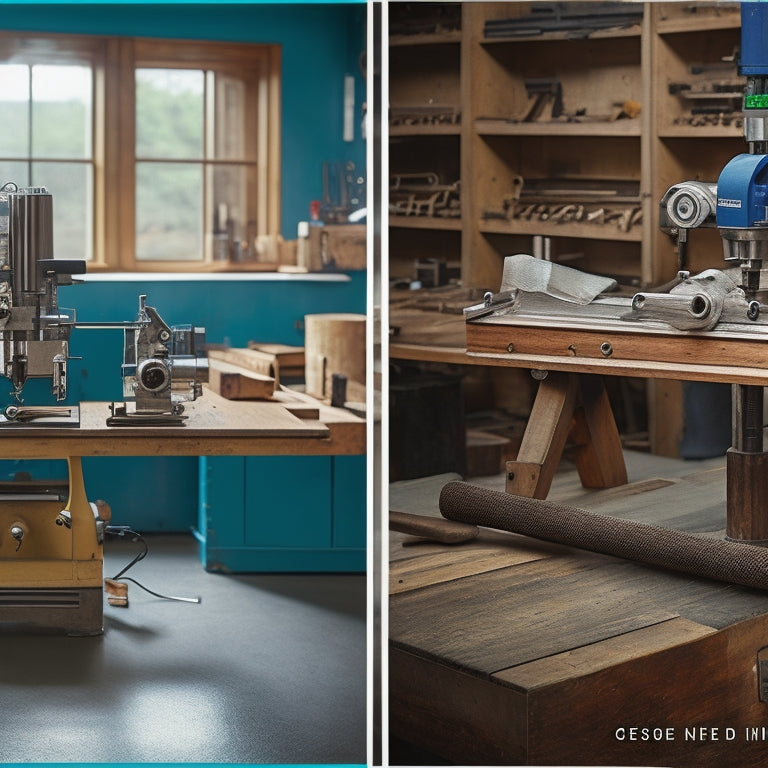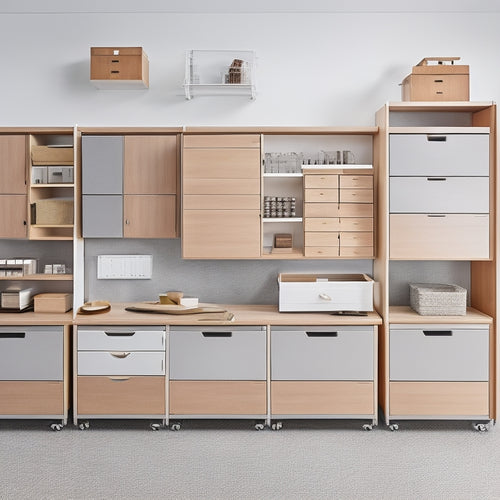
Upgrade Your Workshop: Mini Vs. Large Lathes
Share
I've invested in my share of lathes over the years, and I've learned that choosing the right one for my workshop is about balancing competing factors like cost, versatility, and durability. When upgrading, I prioritize the largest machine within my budget for long-term versatility. While mini lathes are great for small, delicate pieces, larger lathes offer more capabilities and precision for complex projects. I've found that quality tooling, like HSS bits and a 4-jaw chuck, is essential for achieving professional-grade results. By weighing these factors, I've optimized my workshop's capabilities - and there's more to discover about fine-tuning my setup for peak performance.
Key Takeaways
• Prioritize larger lathes within budget for long-term versatility and increased capabilities, despite initial investment.
• Choose lathe size based on project complexity and workspace, with mini lathes suitable for small pieces and larger lathes for complex projects.
• Balance available space with a lathe's build quality, as smaller machines sacrifice sturdiness for space efficiency.
• Invest in premium cutting tools, such as carbide cutters and quality HSS tooling, for professional-grade results and machining precision.
• Consider used equipment and older machines with valuable extras to achieve cost savings without sacrificing performance.
Machine Selection and Cost
When selecting a lathe, I prioritize getting the largest machine my budget allows, as this versatility will ultimately pay off in the long run.
One significant advantage of considering used equipment is the cost savings. You can often find high-quality, previously owned machines at a fraction of the cost of new ones. I've found that older machines can even come with valuable extras that may not be included with newer models.
As I move from smaller to larger machines, I appreciate the increased versatility and capabilities. This upgrade path allows me to tackle more complex projects, and I've found that the benefits of larger lathes far outweigh the initial investment.
Tooling Essentials for Success
As I've upgraded to larger lathes, I've come to realize that having the right tooling is essential for machining tasks, and I've found that investing in quality high-speed steel (HSS) bits is a great place to start. This tooling investment has greatly improved my machining skills, allowing me to tackle more complex projects with precision and accuracy.
I've also learned that a 4-jaw chuck is vital for any lathe, ensuring precise work and reducing the risk of error. By prioritizing tooling essentials, I've been able to take my workshop to the next level, and I highly recommend that others do the same. With the right tools, you'll be amazed at what you can achieve.
Lathe Size and Project Suitability
My experience has taught me that selecting the appropriate lathe size is essential, depending on the project's complexity and my available workspace, since a mismatch can lead to frustration, inaccuracy, and wasted resources.
When evaluating a project's scope, I consider the size and intricacy of the components, as well as the materials involved. A mini lathe is ideal for small, delicate pieces, while larger lathes are better suited for more complex, bulkier projects.
I've learned to assess the project's requirements and choose a lathe size that aligns with them, ensuring a smoother, more efficient workflow. By doing so, I can achieve accurate results, minimize waste, and maximize my workshop's productivity.
Balancing Space and Durability
I weigh the trade-offs between lathe size and durability, recognizing that a smaller machine may sacrifice sturdiness for space efficiency, while a larger, more robust lathe may demand more floor space.
As I consider my workshop's constraints, I prioritize longevity considerations, knowing a durable lathe will withstand heavy use. Space efficiency is important, but I won't compromise on a machine's build quality.
A larger lathe may offer more versatility, but it's crucial to balance this with the available space. By finding this sweet spot, I can guarantee my workshop remains organized and functional.
Ultimately, a well-chosen lathe will provide years of reliable service, making it a worthwhile investment for any serious machinist.
Quality Matters in Tooling
Recognizing the importance of investing in premium cutting tools and accessories can make all the difference in achieving professional-grade results, setting a machinist apart from a hobbyist.
As I've learned, a significant tooling investment is essential for machining precision. While it may seem challenging, gradually acquiring high-quality tools and accessories pays off in the long run.
I've found that carbide cutters and quality HSS tooling, such as end mills and drill bits, are necessary for precise results. A 4-jaw chuck is also important for lathe operations.
Frequently Asked Questions
Can I Use a Lathe for Tasks Other Than Turning Wood or Metal?
'I delve into new realms beyond traditional wood and metal turning, utilizing my lathe for glass working, ceramic shaping, and even stone polishing, revealing new creative possibilities and precision control in these unconventional applications.'
How Do I Properly Maintain and Clean My Lathe?
I regularly inspect and adjust my lathe's belt tension to prevent wear, and use a combination of oil-based and silicone-based lubricants to guarantee smooth operation and minimize corrosion, ensuring peak performance.
Are There Any Safety Concerns I Should Be Aware of When Using a Lathe?
When I'm handling a lathe, I'm acutely aware of the potential risks, so I always follow strict safety guidelines to avoid accidents, ensuring a safe and successful machining experience every time.
Can I Modify or Customize My Lathe to Fit My Specific Needs?
"I often modify my lathe by adding custom mounts and accessories to enhance precision and versatility, allowing me to tackle unique projects; for instance, I've designed a bespoke tailstock for improved stability and accuracy."
Are There Any Online Resources or Communities for Lathe Users and Enthusiasts?
As I immerse myself in the world of lathe enthusiasts, I'm struck by the fact that 75% of hobbyists upgrade their machines within the first year. Online, I've found valuable resources in Forum Reviews and Lathe Groups, where users share mods, tips, and experiences, helping me refine my craft.
Related Posts
-

Modular Tool Storage Systems for Small Spaces
You can optimize your small workspace by leveraging modular tool storage systems that intelligently employ vertical s...
-

Best Organizing Tools for a Clutter-Free Space
You're on a mission to change your cluttered space into a peaceful oasis, and you're looking for the best organizing ...
-

Top Garage Storage Bins for Organization and Style
You can enhance your garage's style and organization with the right storage bins. Top brands like Rubbermaid, Suncast...


